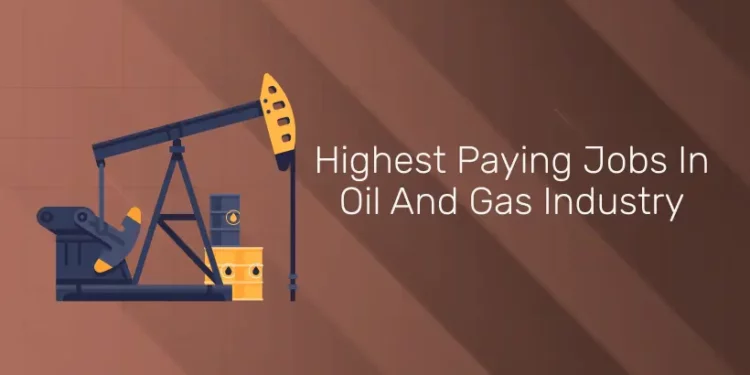Table of Contents
The oil and gas industry provides numerous work opportunities at different phases of the extraction and marketing of oil and gas. A vast variety of job kinds with a wide range of qualifications are included in the oil and gas sector. The oil and gas industry is a dynamic one that needs a constant flow of new hires to keep expanding. Talented people with specific expertise are in high demand as the need for services rises, creating many opportunities to work in this exciting field. In this blogpost we are providing details about the highest paying jobs in oil and gas industry.
Get Certified! Get Confident! Join our Oil and Gas Course!
Highest Paying Job Roles In Oil And Gas Industry
The development and functioning of human civilization will always depend on products related to gas and oil. There are many well-paying positions in the oil and gas production sector, making it unquestionably one of the most lucrative businesses in the world. An increasing number of gifted enthusiasts from all over the world have been drawn to the oil and gas industry. Competitive salary packages are typically awarded to professionals operating in a large business like oil and gas production. Starting salaries in the oil industry can be higher than those of more senior roles in other sectors. To truly climb the ladder and secure the higher-paying positions in oil and gas production, though, a deep understanding of the industry is necessary. Some of the highest paying jobs in oil and gas industries are given below.
Petroleum Engineer
Petroleum engineers hold some of the highest-paying positions in the oil and gas industry. Their main duty is to come up with strategies for economically and efficiently removing gas and oil from the earth. Petroleum engineers frequently have to come up with creative solutions on short notice. Depending on experience, degree, region, industry, and the particular organization one works for, a petroleum engineer’s average pay might vary greatly. Because of the specialized nature of their work and the great demand for their expertise in the oil and gas industry, petroleum engineers often get quite high wages. Depending on the factors like experience and location the average salary of a petroleum engineer ranges between $80,000 to $200,000
Chemical Engineer
In order to successfully design methods for the refining of oil and gas, chemical engineers are in charge of daily evaluations of laboratory data. Formulating procedures for the refinement of crude oil into products like gasoline and kerosene is the main duty of a chemical engineer. Chemical goods for oil and gas exploration and extraction are also developed by them. Depending on the factors like experience and location the average salary of a chemical engineer ranges between $90,000 to $180,000 per year.
Drilling Engineer
Drilling engineers are specialists in the oil and gas sector who find potential oil and gas deposits by carefully examining seismic surveys, core samples, and other data sources. Their foundation of knowledge and skill sets are critical to carrying out drilling operations successfully and ensuring safety at all times. The average salary of a drilling engineer ranges between $80,000 to $180,000 per year.
Health Safety And Environmental (HSE) Manager
In order to create strategies for lessening the effects of oil and gas exploration and extraction on the environment, HSE managers must look into these effects and undertake study.Large environmental risks are associated with oil drilling and extraction. Since climate change is now a reality, scrutiny of oil production methods has grown in recent years. Oil and gas businesses have therefore been searching for HSE managers to assist in mitigating risks and guaranteeing adherence to environmental rules.The average salary of a HSE manager ranges between $80,000 to $150,000 per year.
Reservoir Engineers
To examine subterranean oil and gas reservoirs, the oil and gas industries hire reservoir engineers. Their role is to assess the size of the reservoir, choose the best extraction techniques, and optimize output. To stimulate reservoit activity they employ sophisticated software and modeling methods. The average salary of a reservoir engineer ranges between $90,000 to $180,000 per year.
Gas Plant Operator
A gas plant operator contributes to the safe and effective functioning of the power plant. The utility industry is the primary job market for those who assist systems and equipment by logging production reports, collecting gauge readings, and monitoring alerts.The average salary of a reservoir engineer ranges between $50,000 to $70,000 per year.
Join Our Oil and Gas Course! Get Placement Assistance!
Petroleum Geologist
One extremely specialized area of oil and gas employment is petroleum geology. Petroleum geologists utilize advanced equipment and software to safely extract oil and gas from subterranean deposits. Petroleum geologists analyze seismic data, well logs, and core samples to develop drilling strategies, advise engineers, and estimate exploration costs. The average salary of a petroleum geologist ranges between $70,000 to $180,000 per year.
Project Manager
Project managers are in charge of managing oil projects from the beginning to the end. This include setting objectives for the project, creating plans, and allocating resources. Additionally, they ensure that the project finishes on schedule, under budget, and in accordance with all applicable laws. To guarantee a successful operation, engineers and technicians work together with project managers in the oil industry. The need for project managers in the oil and gas sector has increased due to the rapid advancement of technology. The average salary of a project engineer ranges between $90,000 to $150,000 per year.
Tips To Get Highest-Paying Jobs In Oil And Gas Industry
1: What is the primary purpose of a refinery in the oil and gas industry?
- Prepare by gaining a solid understanding of the oil and gas industry. Discover the various work prospects in the business, ranging from drilling to refining, as well as its various sectors. Finding the highest-paying jobs requires first knowing what opportunities are available.
- To position oneself as a strong candidate, you must possess the necessary credentials and certifications. Think about obtaining a degree or training in safety or petroleum engineering. These qualifications can help you stand out.To position oneself as a strong candidate, you must possess the necessary credentials and certifications. Think about obtaining a degree or training in safety or petroleum engineering. These qualifications can help you stand out.
- Pay disparities might be significant depending on where you work. If you have the flexibility to relocate, look into places where the oil and gas sector is flourishing. Greater income is frequently available for jobs in high-demand areas.
- You enter the job interview with your résumé in hand. Emphasize your experiences and pertinent abilities to make it stand out. Use industry-relevant keywords and personalize it to the position you wish to attract companies.
- If you’re looking for high-paying work, the internet can help. Look through employer pages, career portals, and platforms tailored to a certain industry. You may keep informed about the newest possibilities by setting up job notifications.
- Expert assistance is always available; don’t be afraid to ask. You can get helpful advice and pointers on how to conduct a successful job search from networking contacts, career counselors, and industry specialists.
Conclusion
If you want to work in a great field and make a lot of money, then consider the oil and gas production industry.Their prospects of obtaining the greatest, highest-paying jobs in the oil business are really good. This profession offers a number of careers, such as engineering duties and oilfield service positions, that come with competitive compensation and excellent benefits. The best paying positions in oil and gas production can be obtained by those who have a good educational background, suitable experience, and tenacity.









